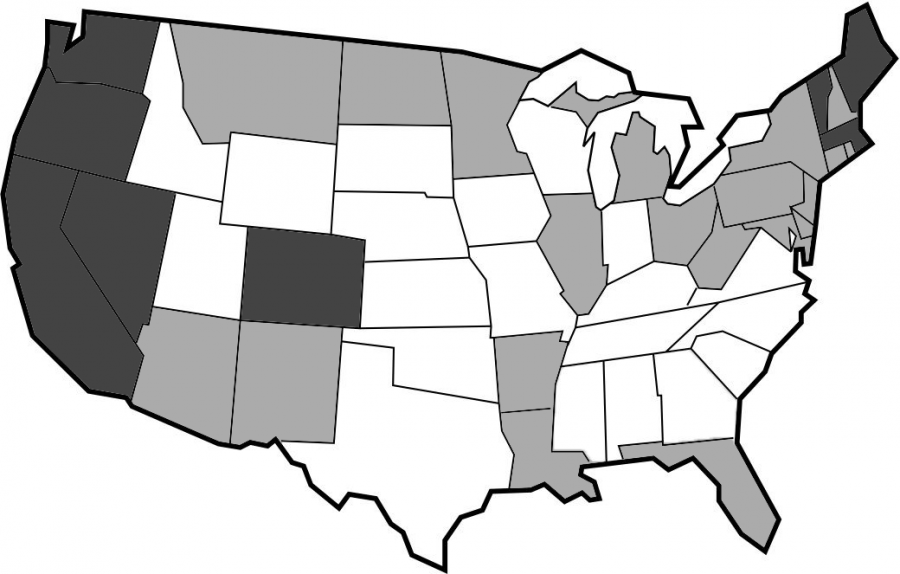Recreational marijuana bill introduced in Pennsylvania
Legalization could have effects on teen use
The states that are colored darker are states that currently have fully legalized the recreational use of marijuana, while lighter-colored states have fully enforced bills on the legalization of medical marijuana
The use of recreational marijuana has been a largely controversial topic throughout America in recent years. Some states have been largely against the legalization, while others have advocated for it. Since Colorado first legalized marijuana in 2012, several states have followed in its footsteps and have either introduced or legalized their own recreational marijuana bills. The most recent state to introduce a recreational marijuana bill is Pennsylvania.
The bill was introduced on Sept. 24 by Democrat representative Jake Wheatly. This bill would allow for recreational use of cannabis for any adult that is 21 or older. Along with that, the bill also would negate any crimes that have been prosecuted against anyone that is currently being held for marijuana-related charges and would release them from jail. Any person who had their driver’s license revoked for marijuana-related crimes would also be allowed to have their driver’s license reinstated and erased from their permanent record.
“For far too long, the criminal justice system has unfairly punished Pennsylvanians, especially minorities, who are caught with cannabis,” Wheatly explained.
If the bill were to be passed, an expected $500 million would be generated for the state every year from purchases from the public. In 2017, Colorado collected over $250 million in taxes and fees related to recreational marijuana sales.
While recreational marijuana would become legal for adults over the age of 21, that also brings about another question: How will it affect the use of marijuana by teenagers?
In Pennsylvania, 32 percent of high schoolers have admitted that they have used marijuana at least one time before. This is lower than the national average of 39 percent but is still a relatively high number. Studies have also shown that high schoolers in rural areas, such as Freedom, have shown to have a higher percentage of users than those that live in urban areas, such as Pittsburgh.
“Recent data shows high school seniors in Pennsylvania drink, smoke, and use other drugs more than their counterparts across the country,” the study by Laurie Roehrich, William Meil, Jennifer Simansky, William Davis, Jr. and Ryan Dunne also stated.
In Colorado — where recreational marijuana has been legal the longest — use of marijuana by teens has dropped significantly. Prior to recreational marijuana being officially distributed in 2014, about 12 percent of teenagers used marijuana illegally. However, according to a study done in 2017, use has fallen to about nine percent, which is the lowest in the state since 2009. Along with the decrease in marijuana use, the state also saw a decrease in the teen use of alcohol, heroin and tobacco.
If recreational marijuana were to be legalized in Pennsylvania, a similar effect may happen which could result in a drop in the use of marijuana by teens. This could be a plausible solution to lower teen use in Beaver county, where 25 percent of teens have said they regularly use marijuana at least once a month.
So far, the bill has gained a lot of support and has gained at least 12 co-sponsors and has a lot of support in the House. According to a recent poll, 54 percent of registered voters in Pennsylvania have said that they would support legalizing recreational marijuana. Whether the bill is legalized or not is still unclear with the first votes to be set in the near future.



